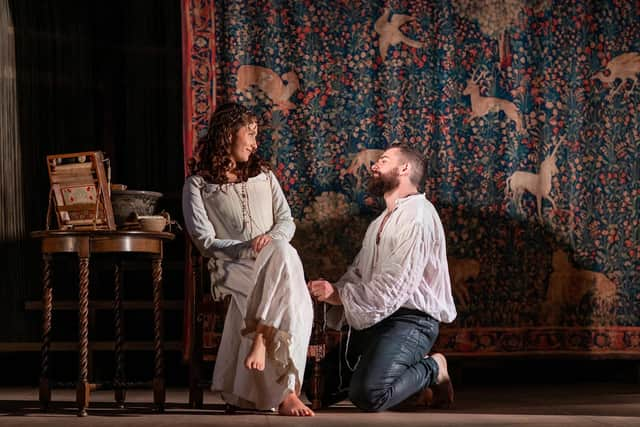Theatre reviews: James IV: Queen of the Fight | Don’t. Make. Tea.
Don’t. Make. Tea., Traverse Theatre, Edinburgh ****
Packed foyers buzzing with excitement, and an audience of more than a thousand piling in to see the world premiere of a new Scottish play. Not since the first three parts of Rona Munro’s history cycle opened at the Festival Theatre in 2014 has Edinburgh theatre seen anything quite like it; and although James IV: Queen Of The Fight is a rollercoaster of a show, with its ups and downs and occasional disappointments, in Laurie Sansom’s eloquent production for Raw Material and Capital Theatres, in association with the National Theatre of Scotland, it offers a beautiful and intense two and a half hours of theatre, full of knotty questions about Scotland’s past and future, and about how we imagine our country, then and now.


Advertisement
Hide AdWe therefore find ourselves on an elegant straw-coloured stockade of a set, by John Bausor, that perhaps reflects a carefully constructed backdrop to the arena – near the present Grassmarket – where, in the early years of the 16th century, James IV would stage the tournaments and pageants he loved to present, in order to show Scotland’s wealth and power to the world. One of the slight disappointments of Munro’s play is that it does not show us a wider range of the shows that might have happened there. There must have been beauty and spectacle, and impressively performed poetry and song; yet we see almost nothing of this except in snatched moments of rehearsal, and that creates problems for Munro in trying to establish her central characters – two black or “Moorish” women called Anne and Ellen who arrived at James’s court after being hjacked on the high seas, the would-be court poet William Dunbar, and a Moorish man, Peter, who was master of the King’s entertainments – as people who were highly valued for their creative contribution to the life of the court.
What Munro does, though, with a tremendous energy picked up and magnified by a superb 11-strong acting company, is to plunge directly into the fraught relationship among these courtiers, and between them, their King, and his young and fragile wife, the English princess Margaret; and to show us how these tensions revolved around royal tournaments in which the King himself would often play a leading role.
These tensions reach a climax when Ellen – who has become the ritual Queen Of the Fight, gloriously dressed, and acting as referee and judge in the games – begins to attract the furious jealousy of both Queen Margaret and Dunbar; and the play shudders to a crisis with Dunbar’s truly horrible “flyting”, or poem of insult, against a black woman, an early example of Scottish racism which has Ellen dismissing the whole nation as a joke.
As it ends, the play therefore seems more like the beginning of a conversation than any kind of conclusion; it raises many unanswered questions about attitudes to race and women 500 years ago – in intensely patriarchal times, and before the rise of Britain’s organised slave trade – and about what happens when we view those times through the prism of modern liberal values.


What is clear, though, is that all of these tensions are laid out with force and passion by Laurie Sansom’s company, led by Danielle Jam and Laura Lovemore as Ellen and Anne, Daniel Cahill as the King, Keith Fleming as a furious Dunbar of whose great poetry we never hear enough, and Thierry Mabongo in the seriously under-written role of Peter. The set and costumes are gorgeous, and beautifully lit by Lizzie Powell, and Paul Leonard-Morgan’s music is exquisite and haunting, although too rarely heard. And if the show leaves us with more questions than answers – well then, so be it; in a time when all of our western history is rightly contested, and needs to be looked at anew.
If James IV compels us to reflect on the role of women and black people in our history, then the new Birds Of Paradise show Don’t. Make. Tea. brings a laser-like focus to the current plight of disabled people in Britain. No longer satisfied with mere doctor’s certificates declaring disabled people unable to work, the UK government notoriously instituted a scheme which involves unqualified officials interviewing people to assess their level of disability by questionnaire, and by their ability to carry out simple tasks – hence the stark warning in the play’s title, against showing too much tea-making ability, and losing vital benefits
Advertisement
Hide AdThe value of Rob Drummond’s play – set in the living room of Chris, a woman with a painful muscular condition and failing eyesight – is that, after introducing us to the full horror of this reality, it carries the nightmarish scenario to a suitably absurdist conclusion, in which something snaps in Chris’s stressed-out brain, and violent and surreal scenes ensue. In Robert Softley Gale’s vivid production, Gillian Dean and Aidan Scott turn in intense and credible performances as Chris and her interviewer, with strong cameo support from Neil John Gibson, Emery Hunter and Nicola Chegwin. And although the Scottish Government is now trying to institute a more compassionate and respectful disability benefits system for Scotland, the pressure on public spending makes it all too possible that the cruel habit of treating all benefit claimants as potential frauds will continue, to the shame of us all.
James IV is at the Festival Theatre, Edinburgh, until 8 October, and on tour until 10 November to Glasgow, Dundee, Inverness, Aberdeen and Stirling, see https://www.rawmaterialarts.com/james-iv Don’t. Make. Tea. is at the Traverse Theatre, Edinburgh, until 8 October, www.traverse.co.uk